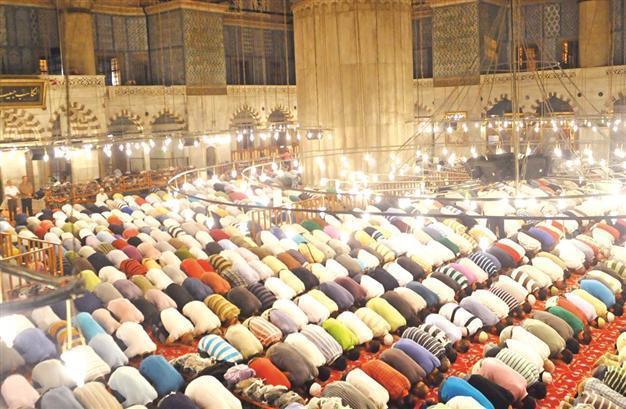Intolerance of religion ‘on the rise’ worldwide
WASHINGTON

In 2010, government restrictions on religion are ‘high or very high’ in most of the Arab Spring countries, where suppression of Islamist movements contributed to the uprisings, according to a recent report published by the Pew Research Center. AA photo
About 75 percent of the world’s people face restrictions on religion as part of a rising tide of government-imposed limits on faith, a recent study has revealed, in which Turkey has fallen from the “very high” restrictions category to “high” since 2007.The report said three quarters of the world’s seven billion people lived in countries with either “high government restrictions on religion or high social hostilities involving religion,” according to data from July 2009 through June 2010 obtained from 197 countries.
The figure is five percent higher than a year earlier, according to the study by the Pew Research Center in an 86-page report from its Forum on Religion and Public Life unit, the third in an ongoing series.
The Government Restrictions Index (GRI) measures government laws, policies and actions that restrict religious beliefs or practices. The GRI is comprised of 20 measures of restrictions, including efforts by governments to ban particular faiths, prohibit conversions, limit preaching, or give preferential treatment to one or more religious groups.
The Social Hostilities Index (SHI) measures acts of religious hostility by private individuals, organizations and social groups. This includes mob or sectarian violence, harassment over attire for religious reasons and other religion-related intimidation or abuse.
Worst: Russia, Pakistan and India
“There were increases in restrictions, even in countries that previously had low or moderate levels of restrictions, including the United States,” the report said. Of the 25 most populous countries examined, Brazil and Japan ranked the best in government restrictions. The worst countries in both categories include Russia, Indonesia, Nigeria, Pakistan and India.
No Western or Latin American country made Pew’s league tables of countries with either “very high” government restrictions or very high social hostilities, Agence France-Presse reported. Six countries, Afghanistan, Egypt, Indonesia, Russia, Saudi Arabia and Yemen, made both lists.
Effect of the Arab Spring
Countries with very high restrictions in mid-2010 were Egypt, Indonesia, Maldives, Saudi Arabia, Afghanistan, Iran, Uzbekistan, Tunisia, Eritrea, China, Syria, Myanmar, Russia, Vietnam, Yemen, Azerbaijan, Algeria and Belarus. The list of 18 countries has lengthened from 10 three years before, and Turkey and Brunei have dropped from the earlier group. However, Turkey remained in the “high” category of both sections, with government restrictions on religion and high social hostilities.
In particular, the study said that in 2010 government restrictions on religion were “high or very high” in most of the Arab Spring countries, where suppression of Islamist movements contributed to the uprisings.
Restrictions in Tunisia went from “high” in mid-2009 to “very high” a year later, the study found. The uprisings in the country began at the end of 2011. In Egypt, restrictions were already high and edged up further between 2009 and 2010, the year before the uprising. In Yemen, restrictions increased sharply over the same period.
Elsewhere in the world, China, the world’s most populous country, had very high government restrictions, while Pakistan, India, Israel and the Palestinian territories were all deemed to have very high social hostilities, such as harassment or mob violence. Overall, the report said, “the rising tide of restrictions ... is attributable to a variety of factors, including increases in crimes, malicious acts and violence motivated by religious hatred and bias, as well as increased government interference with worship or other religious practices.”
The report made no mention of atheists and agnostics who face discrimination resulting from their non-belief in any god or faith.
















